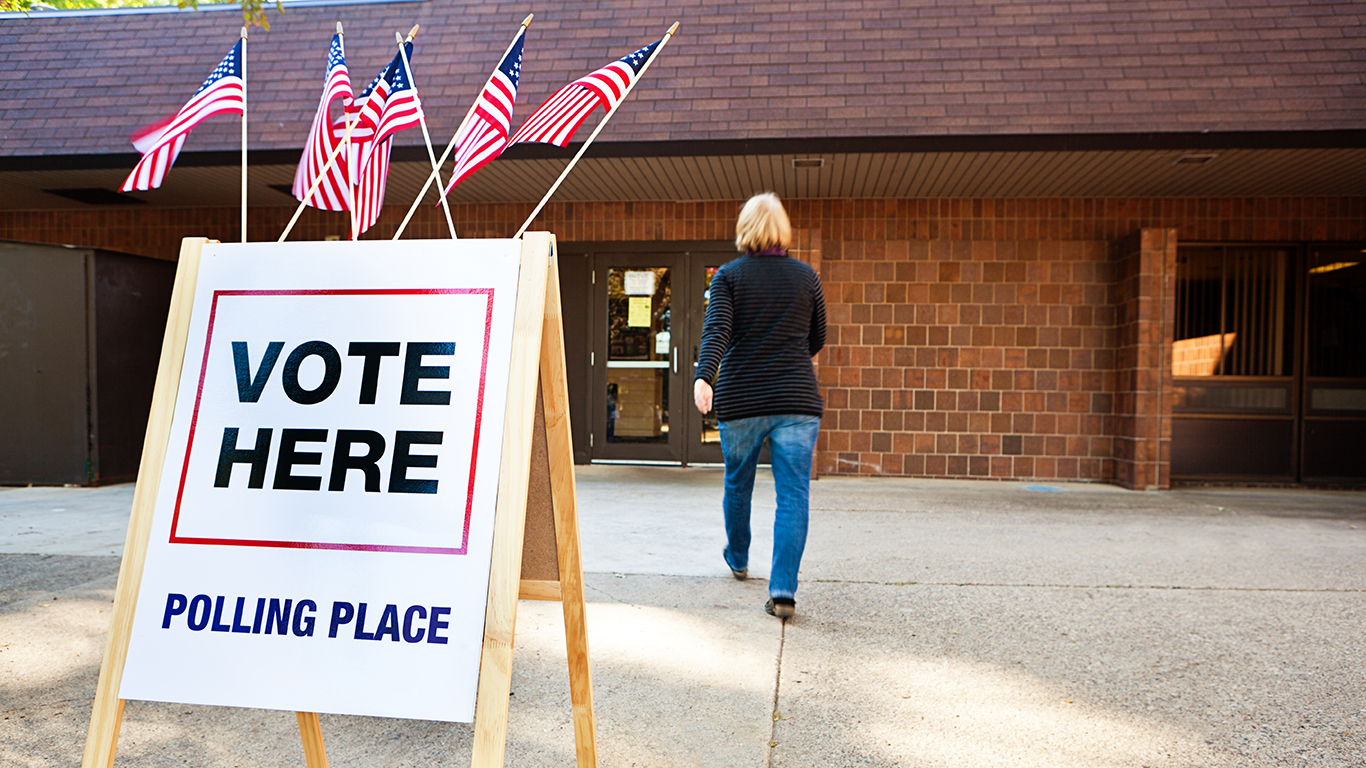Companies and Brands
The 5 States Voting on Marijuana Legalization in November

Published:
Last Updated:

The November elections could add five more states to the 33 that already have legalized medical or recreational marijuana use. For those keeping score at home, if all five ballot measures are passed, enough states will have approved marijuana legalization to pass a Constitutional amendment legalizing (or at least decriminalizing) weed in the entire United States. At the same time, the U.S. Congress can’t even agree to remove marijuana from the list of prohibited Schedule I drugs like heroin, ecstasy and LSD.
[in-text-ad]
Voters in four states (Arizona, Mississippi, Montana, New Jersey) will consider measures approving legal possession and use of marijuana for either medical or recreational purposes, while South Dakota voters both on two measures, one approving recreational use and one approving medical use only. Our review is based on more extensive data from Ballotpedia.
Medical marijuana use has been legal in the state since 2010. A ballot initiative in 2016 that would have legalized marijuana for recreational use in Arizona was defeated when 51.3% of voters rejected it. Supporters of the initiative had raised nearly $3.5 million, including about $2.4 billion from Harvest Health, Cresco Labs and Curaleaf Holdings. Opponents of the measure have raised more than $140,000, but have a staunch ally in Governor Doug Ducey, who opposed the 2016 measure and opposes the current measure.
If approved, recreational marijuana sales will be taxed at 16% in addition to existing state transaction and use taxes of 5.6%. Local governments could ban marijuana growing facilities and testing centers and could control some aspects of regulation, zoning and licensing. The initiative also would permit anyone convicted of certain marijuana-related crimes to petition for an expungement of the criminal records.
With Faulknerian complexity, Mississippi residents will vote on two measures, both supporting different implementations of medical marijuana in the state. First, voters choose between “either measure” and “neither measure.” Those who choose “either measure” then must choose between 65 and 65A. Those who choose “neither measure” can, but are not required to, choose between the alternatives. According to Ballotpedia, “If there are more votes for ‘either’ than for ‘neither’ in the first question, the version that receives majority approval in the second question is enacted, provided it receives approval from at least 40% of the ballots cast at the election.”
Initiative 65 allows medical marijuana treatment for specified qualifying conditions and allows users to possess up to 2.5 ounces of marijuana. The state sales tax of 7% is applied to the purchase.
Alternative 65A restricts smoking marijuana to terminally ill patients and requires stricter controls on quality and oversight. The measure also leaves tax rates, possession limits and other details to the discretion of the legislature.
Supporters of Initiative 65 have raised about $2.7 million and opponents have reported no contributions. An April poll showed that 52% of Mississippi voters supported Initiative 65 and 23% favored Alternative 65A. The remaining 25% either didn’t know (14%) or supported both (5%) or neither (6%).
Nearly 62% of voters approved medical marijuana sales in Montana in 2004. Since then, the state legislature tried twice and failed to overturn the law. This year, Montana voters will vote on both a constitutional amendment (CI-118) and a state statute (I-190) that have a single effect: legalizing marijuana use for recreational purposes for adults at least 21 years old. CI-118 amends the state constitution to give the legislature the authority to raise the age of an adult from 18 to 21 for the purposes of purchasing, consuming or possessing marijuana. I-190 legalizes the use and possession of marijuana for adults 21 years of age and older.
The campaign supporting passage of both amendments has received $5 million in cash and in-kind donations, including $4.8 million from the North Fund and the New Approach PAC. One registered opposition campaign has reported receiving no contributions.
If approved, I-190 imposes a 20% tax on retail sales of marijuana and marijuana-infused products. Local governments would regulate ordinances or resolutions related to marijuana-related businesses and testing facilities. Persons serving sentences for marijuana-related offenses that are no longer crimes could request to be resentenced or to have the conviction expunged.
This measure is a legislatively referred amendment to the state’s constitution that legalizes the recreational use of marijuana for adults at least 21 years old. It also legalizes the cultivation, processing and retail sale of marijuana. This is the first time that a state legislature has placed a legalization measure on the ballot. If approved, the amendment would take effect January 1, 2021. Retail sales would be subject to the state’s 6.625% sales tax, but no additional tax would be assessed. Local governments could enact additional taxes of 2% on recreational marijuana. The legislature approved medical marijuana sales in the state in 2010.
Neither proponents nor opponents of the law have raised any funds. Among likely voters, a recent poll showed 67.6% favor the law, and among registered voters polled in April, 61% supported it.
Measure 26 would legalize a medical marijuana program in the state while Amendment A legalizes the recreational use of marijuana for individuals 21 years old and older. The amendment requires the state legislature to pass legislation enabling a medical marijuana program and the sale of hemp by April 1, 2022. The amendment would place a sales tax of 15% on marijuana sales. Local governments could ban cultivation, testing, wholesalers and retailers from operating within their jurisdictions, but could not interfere with the transportation of marijuana on public roads by licensed persons or firms.
Supporters of the two ballot measures have raised $1 million in cash and in-kind donations, nearly all from the New Approach PAC.
Thank you for reading! Have some feedback for us?
Contact the 24/7 Wall St. editorial team.